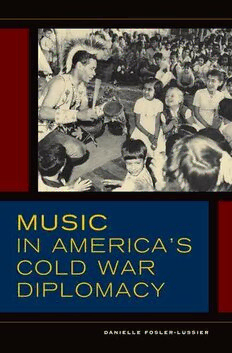
Music in America's Cold War diplomacy PDF
02015·4.697 MB·English
Most books are stored in the elastic cloud where traffic is expensive. For this reason, we have a limit on daily download.
Preview Music in America's Cold War diplomacy
Description:
During the Cold War, thousands of musicians from the United States traveled the world, sponsored by the U.S. State Department’s Cultural Presentations program. Performances of music in many stylesclassical, rock ’n’ roll, folk, blues, and jazzcompeted with those by traveling Soviet and mainland Chinese artists, enhancing the prestige of American culture. These concerts offered audiences around the world evidence of America’s improving race relations, excellent musicianship, and generosity toward other peoples. Through personal contacts and the media, musical diplomacy also created subtle musical, social, and political relationships on a global scale. Although born of state-sponsored tours often conceived as propaganda ventures, these relationships were in themselves great diplomatic achievements and constituted the essence of America’s soft power. Using archival documents and newly collected oral histories, Danielle Fosler-Lussier shows that musical diplomacy had vastly different meanings for its various participants, including government officials, musicians, concert promoters, and audiences. Through the stories of musicians from Louis Armstrong and Marian Anderson to orchestras and college choirs, Fosler-Lussier deftly explores the value and consequences of musical diplomacy.”
See more
The list of books you might like
Most books are stored in the elastic cloud where traffic is expensive. For this reason, we have a limit on daily download.
